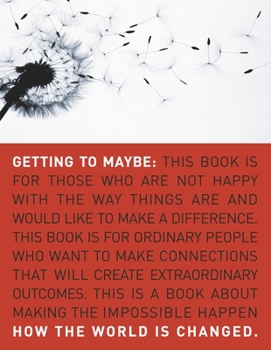Getting to Maybe: How the World Is Changed
Select Format
Select Condition 
Book Overview
A practical, inspirational, revolutionary guide to social innovation Many of us have a deep desire to make the world around us a better place. But often our good intentions are undermined by the fear that we are so insignificant in the big scheme of things that nothing we can do will actually help feed the world's hungry, fix the damage of a Hurricane Katrina or even get a healthy lunch program up and running in the local school. We tend to...
Format:Paperback
Language:English
ISBN:067931444X
ISBN13:9780679314448
Release Date:August 2007
Publisher:Vintage Books Canada
Length:272 Pages
Weight:0.90 lbs.
Dimensions:0.8" x 7.0" x 8.9"
Customer Reviews
4 ratings
very insightful
Published by Thriftbooks.com User , 14 years ago
I'm enjoying this book quite a bit. It gives a pragmatic perspective on complexity with many inspiring examples. Great reading !
How to be a social innovator
Published by Thriftbooks.com User , 14 years ago
This book is inspiring and helps one to understand the processes the social innovator goes through. A good book to share with others who care about social innovation and progress.
Inspiring
Published by Thriftbooks.com User , 16 years ago
This is an inspiring book that gives a good sense of 'complexity theory' and how social change can come from many directions.
Getting better all the time, maybe
Published by Thriftbooks.com User , 16 years ago
I head about this book at the 10th Regenstrief Biennial conference on system transformation of healthcare in the United States. It was mentioned particularly by Paul Biondich and Burke Mamlin with regards to their work to create effective treatment for people with HIV/AIDS in Africa through an open source electronic medical record. (See more at http://www.slideshare.net/bmamlin/openmrs-transformation) The book essentially describes a Zen-Canadian approach to social change. Although loosely based on complexity theory (the one where a butterfly creates a hurricane), complexity theory is very complex, so I would have to say that it is very loosely based. Reading its stories of how profound changes had occurred in social systems such as Muhammad Yunus' Grameen Bank and anti-poverty and anti-racist activists in Canada, it makes a case the change proceeds from a number of phenomena: A deep and human level understanding of social ills nurtured over time which leads to tentative hypothesized solutions rather than a one-size-fits-all quick fix or a certain recipe. A sense of being called to action in a way that almost makes taking action a non-decision for the change agent. An openness to feedback in the problem solving work (a fair amount of time is spent pointing out the ultimate futility of structured plans given the complexity of the world.) A willingness to confront the powerful - be that oneself, ones fears or other social stakeholders who may oppose change. Of interest to me as program staff person at a medium sized US foundation, there is a fairly extensive discussion of the sins of philanthropy with regards to social change. We tend to require more specific objectives and reporting than is realistic given this model of change. We tend to over-evaluate our grantees in terms of these foolish metrics and quantifiable outputs rather than using methods of appreciative inquiry or developmental evaluation to understand the process. I get the sense that at least one of the authors is an evaluator and is tired of being hired to do the wrong thing. Most moving to me were the observations that change is so very hard. Most social innovations fail in important ways. Even when they do succeed, that success is only temporary or limited - it can be reversed by changed circumstances or become a new baseline from which to aspire very quickly. Social innovators in this view face enormous challenges - they are fundamentally alone, necessarily always questioning everything, and doomed by the complexity of the world and human limitation. Is there such a thing as Zen-Existentialism? There seems to me to be a lot of truth in these views. However, I have to say that these change agents' program officers are lousy. In addition to handing out checks and demanding unreasonable reports and evaluations, our major job is to support the grantees. No grantee should ever feel alone, if their program staff person knows what he or she is doing. I still don'




